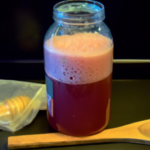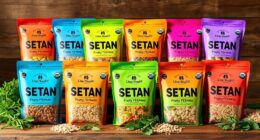If you’re looking to start fermenting delicious, probiotic-rich tempeh at home, I recommend exploring the top 13 culture packs, including options from Cultures for Health, Wira, and Raprima. These come in various forms, from single packets to bulk options, suited for soy-free, gluten-free, and vegan diets. They’re easy to use, reliable, and perfect whether you’re a beginner or an experienced fermenter. Keep going to discover which one best fits your needs and how to get started.
Key Takeaways
- Look for cultures containing Rhizopus Oryzae spores, essential for authentic tempeh fermentation.
- Choose cultures compatible with soy-free, gluten-free, vegan diets for versatile dietary needs.
- Consider bulk or multi-pack options for cost-effective, long-term fermentation projects.
- Ensure the culture includes clear instructions and necessary components like sterilized bags.
- Prioritize non-GMO, natural, and reliable brands known for consistent, easy-to-use tempeh starter cultures.
Cultures For Health Soy-Free Tempeh Starter Culture (4 Packets)
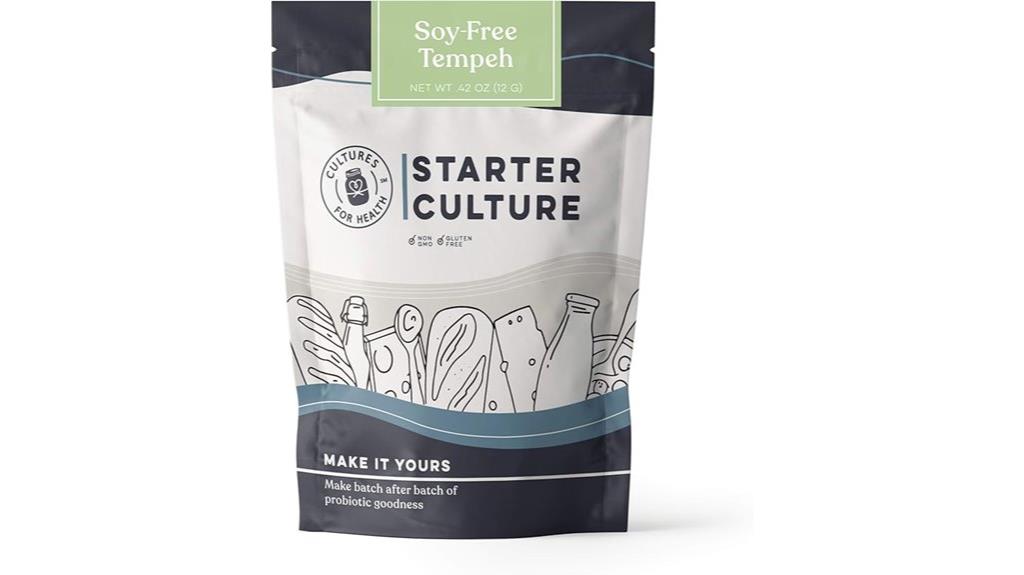
If you’re looking for a soy-free option to make tempeh at home, Cultures For Health’s Soy-Free Tempeh Starter Culture (4 Packets) is an excellent choice. Each packet contains rice-based Rhizopus Oligosporus spores, enough to ferment about 2 cups of dried beans, making multiple batches. The product is gluten-free, non-GMO, and perfect for plant-based diets. Packaged individually, these packets provide detailed instructions for crafting authentic tempeh from various beans like black beans or mung beans. While some users find the small size pricey, buying spores in bulk can save money. Overall, it’s a reliable starter for experimenting with soy-free fermentation.
Best For: vegans and home cooks seeking a soy-free, gluten-free tempeh starter to experiment with various beans and fermentation methods.
Pros:
- Contains rice-based Rhizopus Oligosporus spores suitable for soy allergies and plant-based diets
- Packaged as four individual packets for multiple batches and detailed instructions for success
- Gluten-free, non-GMO, and versatile for fermenting different types of beans like black or mung beans
Cons:
- Small packet size may be costly; buying spores in bulk can be more economical
- Some users experience mold issues or inconsistent fermentation results due to temperature or humidity control
- Requires precise temperature management and patience for optimal results, which may be challenging for beginners
Cultures for Health Worry Free Bundle for Fermentation DIY Set
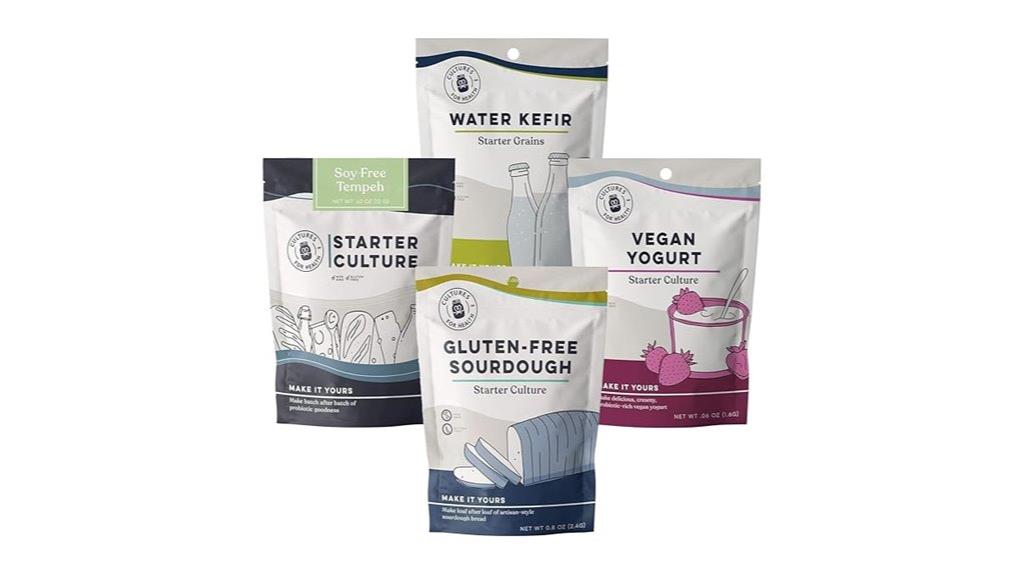
The Cultures for Health Worry Free Bundle for Fermentation DIY Set is an excellent choice for anyone seeking a versatile, all-in-one kit to craft dairy-free yogurt, gluten-free sourdough bread, soy-free tempeh, and dairy-free kefir at home. This extensive set includes GMO-free, gluten-free, and dairy-free starter cultures tailored for various dietary needs. It allows me to enjoy homemade, healthy snacks with full control over ingredients. Plus, it’s perfect for those who want to experiment and personalize their fermented foods. Whether you’re a beginner or experienced fermenter, this set offers an accessible, natural way to expand your culinary repertoire.
Best For: individuals interested in making healthy, gluten-free, dairy-free, and soy-free fermented foods at home, whether beginners or experienced DIY food enthusiasts.
Pros:
- Includes a diverse selection of starter cultures for yogurt, sourdough, tempeh, and kefir, offering variety in homemade fermented foods.
- All products are GMO-free, gluten-free, and dairy-free, catering to various dietary restrictions and health-conscious lifestyles.
- Enables complete control over ingredients, ensuring fresh, wholesome snacks while supporting a fun and engaging DIY process.
Cons:
- May require some initial learning curve for those unfamiliar with fermentation techniques.
- The set may not include detailed instructions for all fermentation processes, potentially necessitating additional research.
- Limited to the specific cultured foods included; not suitable for those looking to make other types of fermented products.
Cultures for Health Tempeh Starter Culture (4 Packets)
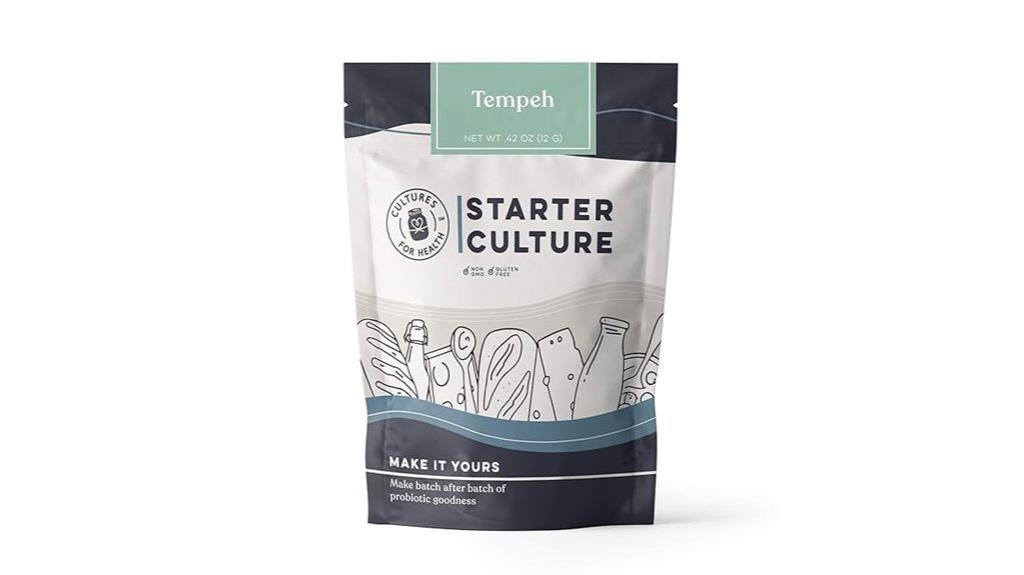
Cultures for Health Tempeh Starter Culture (4 Packets) stands out as an excellent choice for home fermenters seeking a reliable, versatile, and easy-to-use starter. Each packet contains Rhizopus Oryzae spores, enough to culture about 2 cups of dried beans—around 1.5 pounds after soaking and cooking. The gluten-free, non-GMO starter works with various beans like soy, black beans, or chickpeas, making it flexible for different tastes. Clear instructions guide the fermentation process, which typically takes 72 hours but can vary with environmental factors. I appreciate its even spore distribution, ensuring consistent results for authentic, nutritious tempeh.
Best For: home fermenters and plant-based cooks seeking a reliable, versatile starter to make authentic tempeh with various beans.
Pros:
- Easy to use with clear instructions and even spore distribution for consistent results
- Versatile, compatible with multiple bean types such as soy, black beans, and chickpeas
- Gluten-free, non-GMO, and packed with nutritious probiotics
Cons:
- Fermentation process can take longer in cooler environments, requiring patience
- Some users experience mold issues or inconsistent spore growth without proper setup
- Slightly expensive, especially for long-term or frequent fermenters
Wira Tempeh Starter (Ragi Tempe) 17.50 ounce (Pack of 1
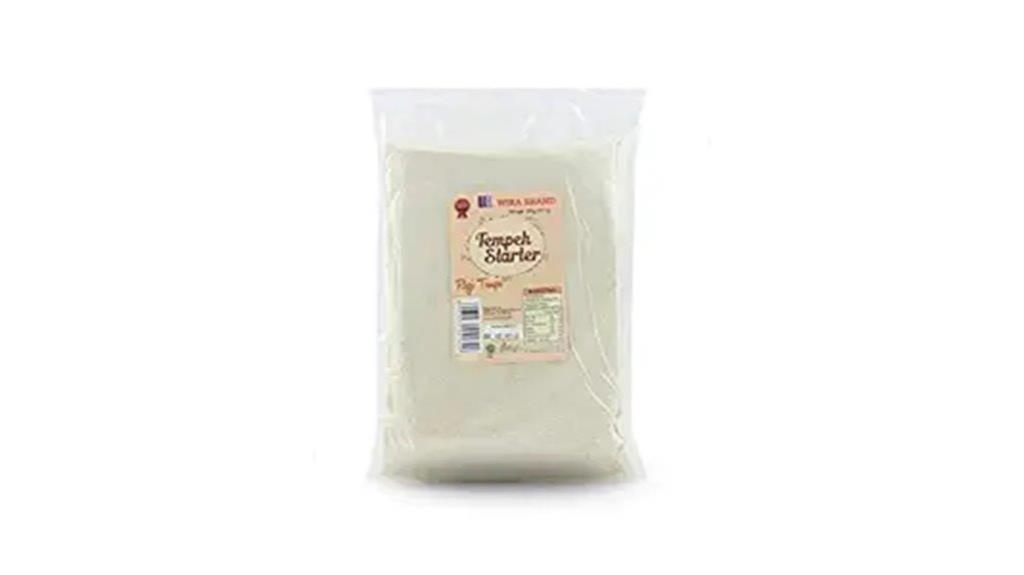
Wira Tempeh Starter (Ragi Tempe) 17.50 oz is an ideal choice for health-conscious individuals looking to make nutritious, homemade tempeh with minimal effort. Just two tablespoons of this natural starter are enough to ferment your own ragi-based tempeh. It’s simple to use, cost-effective, and perfect for those seeking a wholesome, plant-based protein source. Rich in protein, fiber, calcium, and iron, ragi adds nutritional value to your tempeh while supporting good digestion through probiotics. Made from all-natural, gluten-free, non-GMO ingredients, this starter aligns with a clean, healthy diet and makes homemade fermentation accessible and enjoyable.
Best For: health-conscious individuals and home cooks seeking an easy, natural way to make nutritious, plant-based tempeh using ragi.
Pros:
- All-natural, gluten-free, and non-GMO ingredients ensuring purity and health benefits
- Easy-to-use with just 2 tablespoons needed per batch, making fermentation simple and cost-effective
- Rich in protein, fiber, calcium, and iron, supporting a nutritious and wholesome diet
Cons:
- Requires basic knowledge of fermentation to achieve optimal results
- May need some equipment or experience with tempeh making for best outcomes
- Limited to ragi-based tempeh, which might not suit those seeking other varieties of tempeh
Tempeh Starter Culture with Rhizopus Spores

If you’re passionate about making authentic, protein-rich tempeh at home, the Tempeh Starter Culture with Rhizopus Spores is an excellent choice. This 0.7oz package contains non-GMO, gluten-free spores specifically designed for fermenting soybeans or other beans, cereals, and peas. It’s perfect for DIY vegans and vegetarians who want to craft traditional tempeh with ease. The spores develop into a mycel network that binds the beans together, creating the signature texture and flavor. Using this starter, you can produce nutritious, high-protein tempeh that absorbs flavors well, making it a versatile addition to your plant-based recipes.
Best For: home cooks, vegans, and vegetarians looking to make authentic, high-protein tempeh easily and safely in their own kitchens.
Pros:
- Non-GMO and gluten-free, suitable for various dietary needs
- Easy-to-use starter culture that produces authentic tempeh with minimal effort
- High in plant-based protein, enhancing nutritious meal options
Cons:
- Requires fermentation time and proper handling to ensure successful results
- Limited to tempeh production; not suitable for other fermentation projects
- Small package size may require multiple batches for frequent use
Cultures For Health Soy-Free Tempeh Starter Culture (4 Packets)
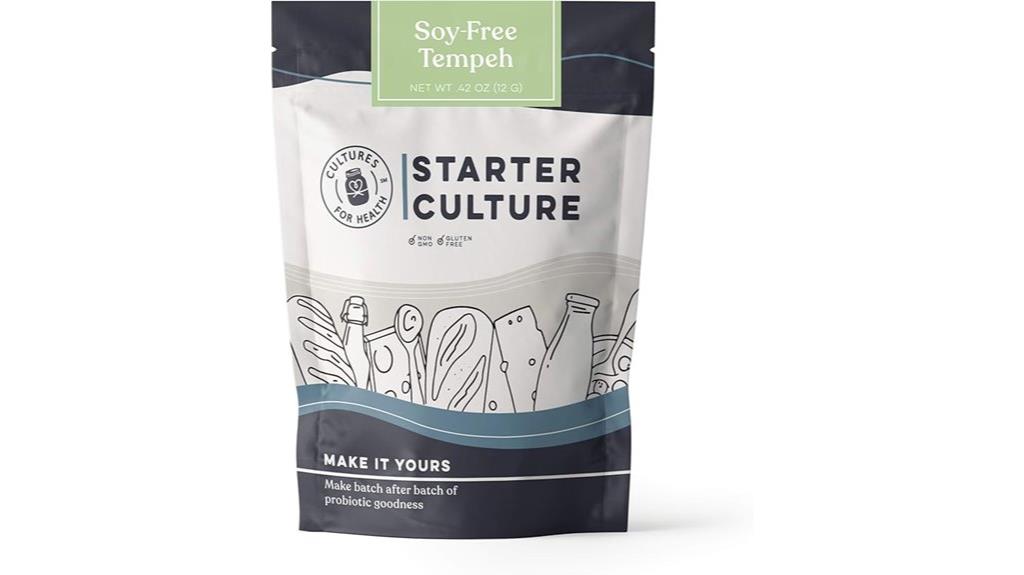
The Cultures For Health Soy-Free Tempeh Starter Culture (4 Packets) is ideal for home cooks seeking a gluten-free and plant-based option, especially those who want to avoid soy or are experimenting with different beans. Each packet contains rice-based Rhizopus Oligosporus spores, enough to ferment about 2 cups of dried beans per batch. It’s perfect for making tempeh from various beans like black beans, mung beans, or chickpeas. The product is non-GMO, gluten-free, and supports vegan diets. While some find the small packets costly, buying spores in bulk can be more economical. Overall, it’s a versatile starter for creating healthy, protein-rich tempeh at home.
Best For: home cooks looking for a gluten-free, soy-free, vegetarian, and versatile starter culture to make plant-based tempeh from various beans at home.
Pros:
- Suitable for gluten-free and soy-free diets, supporting vegans and those with allergies.
- Includes detailed instructions and is versatile for fermenting different types of beans.
- Non-GMO and made from rice-based spores, ensuring a natural fermentation process.
Cons:
- Small packet size may be costly; larger quantities could offer better value.
- Some users experience difficulty with temperature control, affecting fermentation success.
- Occasional mold or spoilage issues if conditions are not properly maintained during incubation.
Cultures for Health Vegan Protein Bundle (8 Packets)
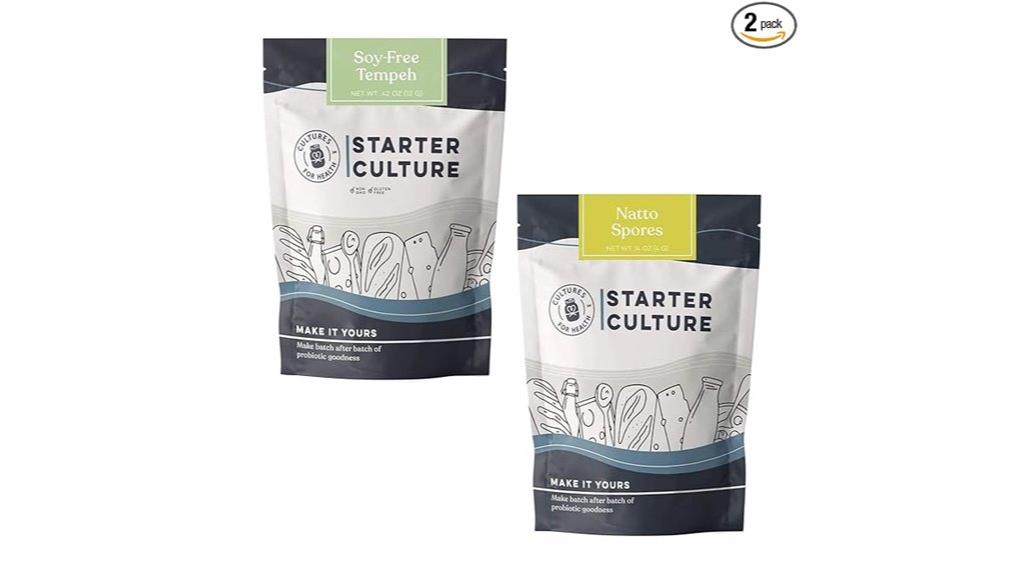
For anyone enthusiastic to make plant-based proteins at home, the Cultures for Health Vegan Protein Bundle (8 Packets) stands out as a versatile choice. It includes 4 packets for soy-free tempeh and 4 for natto, allowing you to produce about 1.5 pounds of tempeh and 24 cups of natto from just 16 cups of dried beans. Each packet can culture up to 2 cups of dried beans and comes with clear instructions. This bundle supports fermenting a variety of beans like black, garbanzo, mung, and adzuki. It’s perfect for creating nutritious, probiotic-rich, soy-free, and gluten-free plant proteins at home.
Best For: individuals interested in making homemade, plant-based, soy-free, and probiotic-rich proteins like tempeh and natto using versatile fermentation starter spores.
Pros:
- Supports homemade production of soy-free tempeh and natto with easy-to-follow instructions.
- Allows fermentation of a variety of beans, including black, garbanzo, mung, and adzuki beans.
- Provides high-protein, probiotic-rich, gluten-free plant foods suitable for vegan and vegetarian diets.
Cons:
- Requires some kitchen equipment and time for fermentation and preparation.
- Limited to producing about 1.5 pounds of tempeh and 24 cups of natto per kit, which might not suffice for large quantities.
- Fermentation results can vary depending on bean type, moisture, and temperature conditions.
Cultures for Health Vegan Protein Bundle (8 Packets)
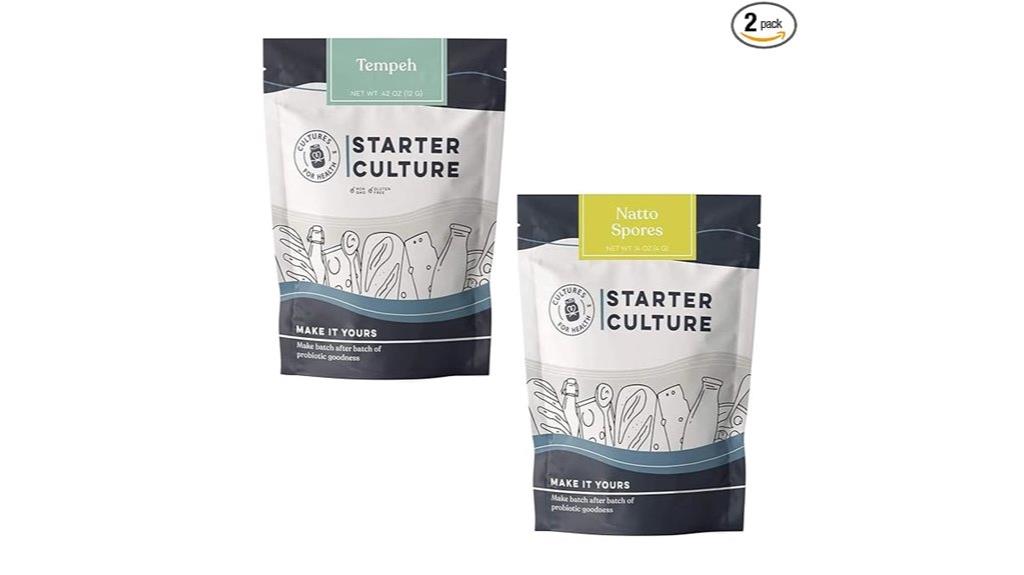
Those looking to make both tempeh and natto at home will find the Cultures for Health Vegan Protein Bundle (8 Packets) an excellent choice, especially since it includes spores for both fermentation types. With four tempeh starter spores and four natto starter spores, you get enough to ferment about 1.5 pounds of tempeh and 24 cups of natto from 16 cups of dried beans. The kit comes with clear instructions, making it accessible for beginners. Whether you prefer the nutty flavor of tempeh or the strong aroma of natto, this bundle offers versatility and nutritional benefits, including probiotics, protein, and essential nutrients.
Best For: Home cooks and fermentation enthusiasts interested in making plant-based proteins like tempeh and natto with an easy-to-use, versatile starter kit.
Pros:
- Includes spores for both tempeh and natto, offering variety in fermentation options
- Suitable for beginners with clear instructions included
- Provides nutritional benefits such as probiotics, protein, and essential minerals
Cons:
- Requires dried beans and additional ingredients for fermentation, which may be an extra step for some users
- Fermentation process may take several days, requiring patience and proper temperature control
- Limited to soybeans and similar beans, which may not suit those with legume allergies or preferences
10 pcs Plastic Bags for Tempeh with Starter/Live Culture/Ragi Tempe 50g

If you’re serious about making authentic tempeh at home, these plastic bags with live Ragi Tempe culture are an excellent choice. Each pack contains 10 tearproof, clear polyethene bags measuring 102mm x 203mm with a zipper closure, perfect for storing and fermenting tempeh. Included is 50g of non-GMO live culture, ensuring active fermentation. Made in Indonesia, these bags are sturdy at 30 microns thick, designed to preserve freshness and live cultures during your process. They’re vegetarian-friendly and easy to use, making them ideal for both beginners and experienced fermenters looking for reliable storage solutions.
Best For: home fermenters, vegetarians, and anyone passionate about making authentic Indonesian tempeh with live cultures.
Pros:
- Includes 10 durable, tearproof plastic bags with zipper closure, perfect for multiple fermentations.
- Contains 50g of non-GMO live Ragi Tempe culture to ensure active fermentation.
- Made from sturdy 30-micron thick polyethylene, providing reliable protection and freshness during storage.
Cons:
- Limited to 10 bags per pack, which may not be sufficient for high-volume production.
- Only suitable for tempeh fermentation and storage, not versatile for other food preservation needs.
- May require additional equipment or ingredients for complete tempeh making process.
Cultures for Health Tempeh Starter Culture (4 Packets)
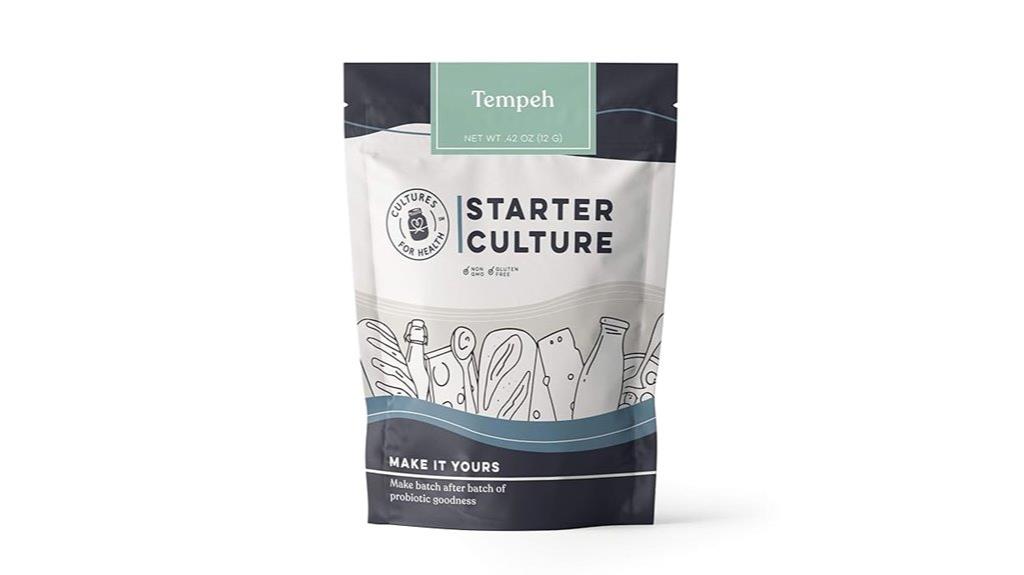
Cultures for Health Tempeh Starter Culture (4 Packets) stands out as an ideal choice for home fermenters seeking reliable, authentic tempeh production without breaking the bank. Each packet contains spores of Rhisopus Oryzae, enough to culture about 2 cups of dried beans—roughly 1.5 pounds after soaking and cooking. The gluten-free, non-GMO starter works with various beans like soy, black beans, and mung beans. It comes with detailed instructions, ensuring successful fermentation. I appreciate its even spore distribution, which helps produce consistent, flavorful tempeh. This set offers great value, making it easier to experiment and perfect your homemade tempeh.
Best For: home fermenters and DIY food enthusiasts looking for a reliable, authentic, and versatile tempeh starter culture to produce high-quality plant-based protein at home.
Pros:
- Easy to use with detailed instructions that ensure successful fermentation
- Versatile, compatible with various beans like soy, black beans, mung beans, and more
- Gluten-free, non-GMO, and offers consistent, flavorful tempeh production
Cons:
- Can be more expensive compared to homemade or bulk cultures over time
- Environmental factors such as temperature and humidity significantly influence fermentation outcomes
- Some users may experience mold issues or inconsistent spore growth without proper setup
NON-GMO-Tempeh Starter/Live Culture/inokulum/Ragi Tempe 30 gram
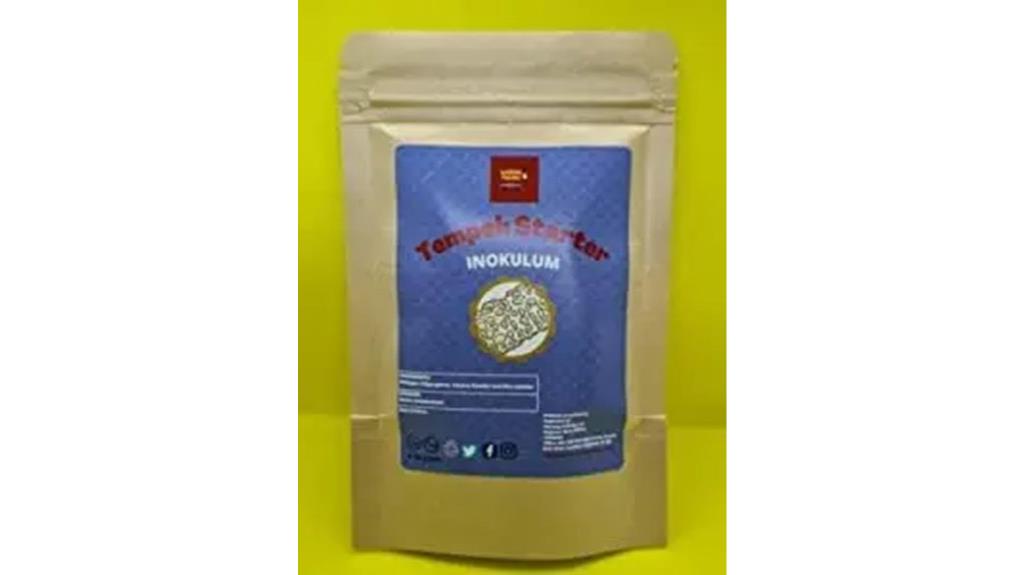
For anyone seeking a reliable, non-GMO option to ferment soybeans into high-quality tempeh, the NON-GMO Tempeh Starter / Live Culture / Inokulum / Ragi Tempe 30 grams is an excellent choice. Made from fermented soybeans, this starter is suitable for vegans and vegetarians, ensuring a plant-based, protein-rich product. It produces excellent tempeh on your first attempt and can be stored at room temperature, making it convenient and easy to handle. Supporting your fermentation journey, this culture helps you create authentic, nutritious tempeh while maintaining non-GMO standards. It’s a versatile and dependable option for home chefs.
Best For: home cooks, vegans, and vegetarians seeking a reliable, non-GMO starter to ferment soybeans into high-quality, protein-rich tempeh.
Pros:
- Produces authentic, high-quality tempeh on the first attempt
- Non-GMO and suitable for vegan and vegetarian diets
- Easy to store at room temperature for convenience
Cons:
- Requires fermentation time and proper handling to achieve best results
- Does not include detailed step-by-step instructions (may need additional guidance)
- Limited to soybean fermentation; not suitable for other beans or grains
Raprima Ragi Tempe Inokulum (Tempeh Yeast), 500 Gram
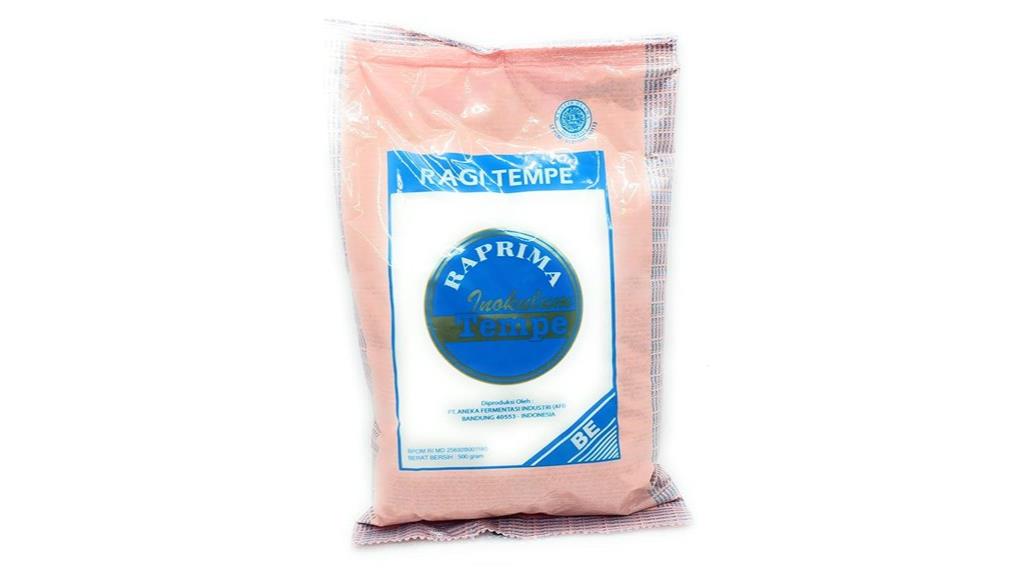
Looking to produce high-quality tempeh at home or on a small scale? The Raprima Ragi Tempe Inokulum (Tempeh Yeast), 500 grams, is an excellent choice. Made in Indonesia, this starter culture is essential for a successful fermentation process. It’s used to ferment soybean cakes, ensuring a consistent and healthy tempeh. To get the best results, you’ll need to maintain proper room temperature and humidity, which promote yeast growth and improve the final product’s quality. Keep in mind, environmental factors play a crucial role in fermentation success. Proper conditions will help you achieve delicious, well-textured tempeh every time.
Best For: home fermenters, small-scale tempeh producers, and those seeking authentic Indonesian starter cultures for high-quality tempeh.
Pros:
- Made in Indonesia with authentic fermentation culture
- 500 grams provides ample quantity for multiple batches
- Supports consistent and healthy tempeh fermentation when environmental conditions are maintained
Cons:
- Requires specific temperature and humidity control for optimal results
- Environmental factors can affect fermentation success and final product quality
- Not suitable for those looking for a quick or low-maintenance fermentation process
Tempeh Kit with 10 Plastic Bags, Starter & Live Culture
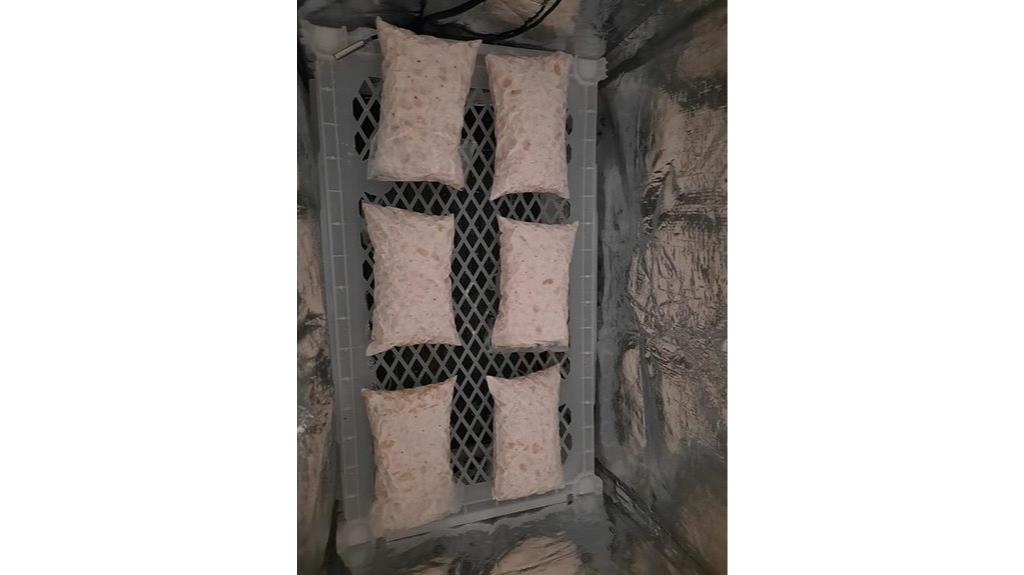
If you want to make tempeh at home with ease, this tempeh kit is an excellent choice because it includes everything you need for a straightforward fermentation process. It features 10 sterilized plastic bags, each measuring 102mm x 203mm, perfect for packaging your tempeh, plus 50 grams of non-GMO live culture (Ragi) to guarantee successful fermentation. The kit also comes with a detailed manual that guides you through each step. Designed for convenience and hygienic storage, this vegan-friendly starter pack simplifies home tempeh-making, making it accessible even for beginners. It’s an all-in-one solution that assures fresh, homemade tempeh with minimal fuss.
Best For: home cooks and fermentation enthusiasts looking for an easy, complete solution to make fresh, homemade tempeh with minimal effort.
Pros:
- All-in-one kit includes plastic bags, live culture, and manual, simplifying the tempeh-making process.
- Vegan-friendly, non-GMO live culture ensures safe and natural fermentation.
- Hygienic packaging and clear instructions make it suitable for beginners.
Cons:
- Limited to small batches with only 50 grams of starter culture per kit.
- Requires additional ingredients like soybeans or other beans for actual tempeh production.
- The kit’s size and contents may not be ideal for those wanting to produce large quantities regularly.
Factors to Consider When Choosing Tempeh Starter Culture Packs
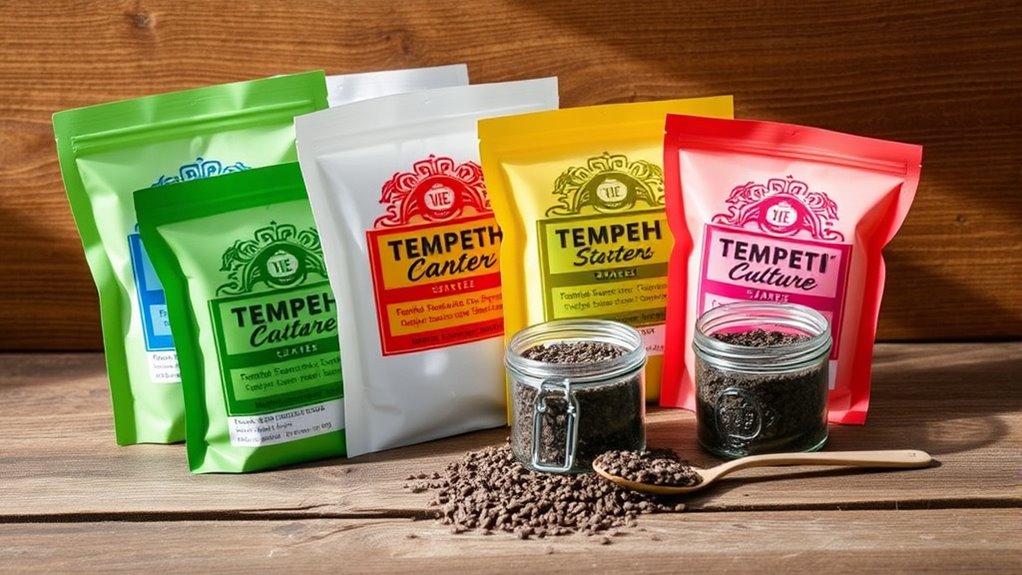
When choosing a tempeh starter culture, I consider how well it works with my beans and fermentation setup. I also look at the culture’s strength, quantity, and whether it fits my budget for the long run. Finally, I prioritize ease of use to make the process straightforward and consistent.
Compatibility With Beans
Choosing the right tempeh starter culture depends heavily on its compatibility with the beans you’re using, as this affects fermentation success. Different cultures are optimized for specific beans like soy, black beans, or adzuki, which can influence how well they develop mycelium and produce desired flavors. Some starter cultures are versatile and work with various beans, offering flexibility for different recipes. Compatibility ensures the spores can effectively colonize the beans, reducing the risk of mold or contamination and improving fermentation efficiency. Additionally, the bean type can impact the flavor and texture of your tempeh, so selecting a culture suited to your beans helps achieve the best results. Paying attention to compatibility is key to a successful, tasty fermentation process.
Fermentation Environment Needs
Selecting the right tempeh starter culture requires careful attention to the fermentation environment, as factors like temperature, humidity, and aeration directly impact mold growth and overall fermentation success. Maintaining a consistent incubation temperature between 85°F and 95°F (29°C to 35°C) is crucial for ideal mold development and proper fermentation. Humidity levels around 80% support healthy mycelial growth and prevent dryness or unwanted mold. Proper aeration, through perforated containers or breathable bags, ensures sufficient oxygen flow, which mold spores need to thrive. Additionally, keeping the environment clean and sterilized minimizes contamination risks that could spoil the tempeh. Fluctuations in temperature or humidity can delay fermentation or cause undesirable mold growth, so stable environmental control is essential for a successful batch.
Culture Potency & Quantity
The potency and quantity of a tempeh starter culture are key factors that directly impact the success of your fermentation. Higher spore concentrations mean more effective fermentation, resulting in a stronger mycelial network and more consistent results. If the culture isn’t potent enough, you might need to use more of it or supplement with additional cultures, especially for larger batches. The amount of culture included in a pack also determines how many batches you can produce, affecting overall costs. Smaller packets may require multiple uses or supplementation to reach desired potency levels. Choosing a culture with sufficient spores ensures reliable fermentation, particularly when scaling up production or experimenting with different bean types. Ultimately, both potency and quantity influence your success and efficiency in making quality tempeh.
Price & Long-term Cost
Considering the long-term costs of tempeh starter cultures involves more than just comparing upfront prices; it’s essential to evaluate how many batches each pack can produce and how many times it can be reused. Buying in bulk can substantially lower the cost per batch, making it more economical over time. Higher-quality or larger quantities often have a higher initial price but pay off through multiple fermentations. Some cultures are designed for repeated use, further reducing expenses. Additionally, creating your own starter cultures through fermentation can eliminate the need for continual purchases, offering a cost-effective solution. When comparing options, focus on the number of uses per packet and overall longevity to find the most budget-friendly choice for your fermentation journey.
Ease of Use
When choosing a tempeh starter culture, ease of use is crucial to guarantee a smooth fermentation process, especially for beginners. Look for a starter that includes clear, step-by-step instructions to guide you through each stage. Pre-measured, portion-controlled packets simplify the process by eliminating measurement errors and saving time. Compatibility with common fermentation equipment like incubators, heat mats, or warm environments is also important for consistency. A user-friendly culture should have a stable shelf life and not require complex storage conditions, making it easier to keep on hand. Additionally, clear labeling and detailed guidance on fermentation times and temperature ranges help ensure successful results, reducing frustration and increasing confidence as you start your fermentation journey.
Frequently Asked Questions
How Long Does It Take for Different Starter Cultures to Ferment?
It usually takes about 24 to 48 hours for different starter cultures to ferment tempeh. I’ve found that warmer environments speed up the process, while cooler ones slow it down. Some cultures may ferment a bit faster or slower depending on their strength and quality. I recommend checking the tempeh daily during fermentation to guarantee it develops the right texture and flavor.
Are There Specific Starter Cultures for Vegan or Allergen-Free Tempeh?
Yes, there are specific starter cultures designed for vegan or allergen-free tempeh. I recommend looking for cultures that are certified allergen-free and plant-based, ensuring they don’t contain soy, gluten, or other common allergens. These cultures are often labeled as vegan-friendly and are perfect for those with sensitivities. I always check the ingredient list to make sure they meet my dietary needs and produce safe, delicious tempeh.
Can Starter Cultures Be Reused for Multiple Fermentation Batches?
Yes, I’ve found that starter cultures can often be reused for multiple batches if you keep them healthy. I rinse and dry the culture carefully after each fermentation, then store it in a cool, dry place. Just keep an eye on its activity and smell—if it seems off or weak, it’s best to start fresh. Reusing cultures saves money and helps maintain consistent flavor.
What Are the Storage Requirements for Tempeh Starter Cultures?
Ever wondered how to keep tempeh starter cultures fresh? I always store mine in the fridge at or below 40°F (4°C). Keep them in an airtight container to prevent moisture and contamination. Some prefer freezing for long-term storage, but always check the manufacturer’s instructions. Proper storage guarantees your cultures stay active and healthy, making your fermentation successful every time!
How Do I Troubleshoot Failed Fermentation With My Starter Culture?
If your fermentation fails, I recommend checking the temperature—it should be around 86°F (30°C). Make sure your starter culture is fresh and hasn’t expired. Confirm your soybeans are properly cooked and dry enough for fermentation. Keep your environment clean to prevent contamination. Sometimes, a simple restart with a fresh culture and proper conditions gets things back on track. Don’t get discouraged—fermentation is a learning process!
Conclusion
So, as I discovered, choosing the right tempeh starter culture can feel like a happy coincidence, turning your fermentation journey into a delightful experience. Whether you go for a convenient pack or a larger inokulum, finding the perfect fit makes all the difference. Trust me, once you get started, you’ll find that the right culture almost seems to choose you—making your tempeh adventures even more enjoyable and rewarding.
Hi, I’m Alexander. I’m a vegan of over 20 years, and I initially made the switch for health reasons. However, as time went on, I became more and more passionate about the ethical and environmental implications of leading a vegan lifestyle.
I am the author of The Graceful Kitchen, a vegan blog where I share recipes for delicious and nutritious vegan meals. As someone who is deeply committed to living a cruelty-free life, I am also a strong advocate for using whole foods as the foundation of a healthy diet – and believe that going vegan is one of the best ways to achieve this.



